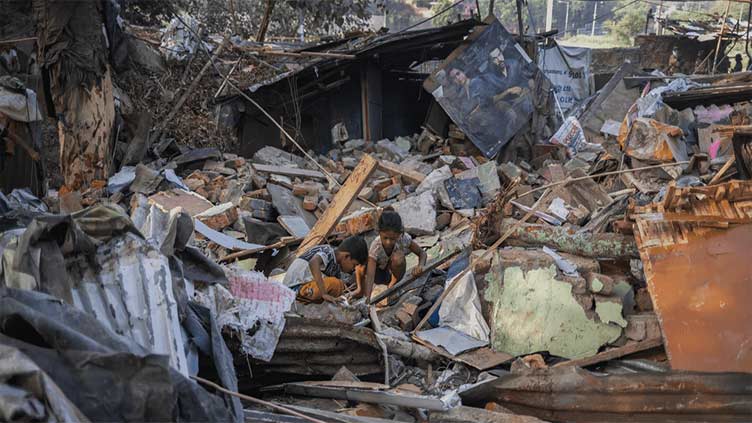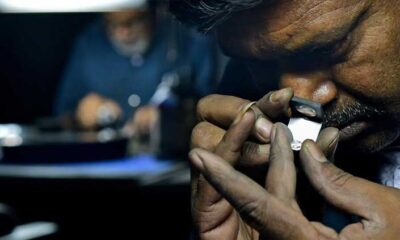When residents of a slum cluster in New Delhi’s Janta Camp area heard that the G20 Summit was to be held in the Indian capital, barely 500 metres from their homes, they expected it would benefit them as well.
Instead, they were rendered homeless.
Dharmender Kumar, Khushboo Devi, and their three children were among scores of people in India’s national capital whose houses were demolished over the past few months – action that both residents and activists say is part of the beautification work for the Sept. 9-10 summit.
Officials from Prime Minister Narendra Modi’s federal government, which has been carrying out the demolitions, however, say the houses were built illegally on government land and their removal “is a continuous activity”.
Houses in slums like the one in Janta Camp are built over years like patchwork. Most of the residents work in nearby areas and have lived within the confines of their small homes for decades.
The demolitions started four months ago. Bulldozers visited Janta Camp on a hot morning in May and video footage of the demolition shows temporary houses made of tin sheets being razed to the ground as people who once called them home stand watching, some of them breaking down in tears.
The camp, which sits near Pragati Maidan – the summit’s main venue – is emblematic of much of Delhi’s landscape.
Many of the city’s 20 million residents live in largely unplanned districts that have mushroomed into existence over years.
In 2021, Hardeep Singh Puri, the minister for housing and urban affairs, said in parliament that 13.5 million people reside in unauthorized colonies in Delhi.
“The government is demolishing houses and removing vulnerable people in the name of beautification without any concern about what will happen to them,” said Sunil Kumar Aledia, executive director and founding member of the New-Delhi based Centre for Holistic Development, which works with the homeless.
“If this had to be done, residents should have been warned in time and places found where they could have been rehabilitated,” he added.
India’s Supreme Court ruled last month that squatters cannot claim the right to occupy public land. At best, they can seek time to vacate the public land and apply for rehabilitation, it said.
At least 49 demolition drives were conducted in New Delhi between April 1 and July 27, with nearly 230 acres of government land being reclaimed, Kaushal Kishore, the junior minister for housing and urban affairs, said in parliament in July.
“No house has been demolished to beautify the city for the G20 summit,” he said.
The demolition of the Janta Camp shanties came as a rude shock for Mohammed Shameem, another resident, who said he thought the “big people” attending the G20 summit would “give something to the poor”.
The opposite is happening here. Big people will come, sit on our graves and eat,” he said.
For Kumar, who works as a clerk in a Pragati Maidan office, the demolition of his home and the eviction of his family had larger connotations.
“If we relocate from here, my children’s education will also suffer. Here they are able to study because the school is nearby,” he said. Two of Kumar’s children – five-year-old Srishti and 10-year-old Eshant – attend a government school in the area. His younger daughter, Anokhee, is nine months old.
The family, which also includes Khushboo Devi’s father, had been residing in their shanty for 13 years until they were asked to vacate the land “because the area had to be cleaned”.
“If they have to clean, that does not mean they will remove the poor. If the poor are looking so bad, they can make something nice, put a curtain or a sheet so that the poor are not visible,” Devi told Reuters.
As the bulldozers departed after reducing their homes to rubble, Kumar and his wife began organising their belongings, which lay strewn by the side of the road.
Afterwards, they piled these into a three-wheeler which transported them to their new accommodation – a single room located 10 km (6.21 miles)away, for which they paid a monthly rent of 2,500 rupees ($30.21).
Their daughter, meanwhile, carefully lifted a peach-coloured dress that had been thrown to the ground, along with everything else that her parents owned, and dusted it off.
Two months later, in August, the family returned to a part of the Janta Camp area that had been spared by the bulldozers, paying a higher rent of 3,500 rupees for a room.
“It was difficult for my children to go to school everyday from the place we were staying in earlier. I want them to study and do well, we returned for their sake,” Kumar said.
Post Views: 65


 Fashion3 months ago
Fashion3 months ago
 World3 months ago
World3 months ago
 World3 months ago
World3 months ago
 Sports3 months ago
Sports3 months ago
 Sports3 months ago
Sports3 months ago
 World3 months ago
World3 months ago
 Business2 months ago
Business2 months ago
 Tech3 months ago
Tech3 months ago



















